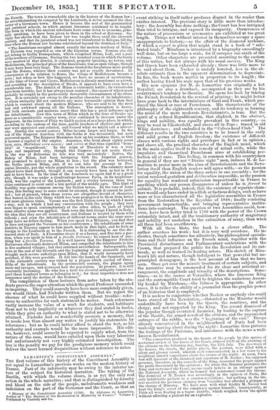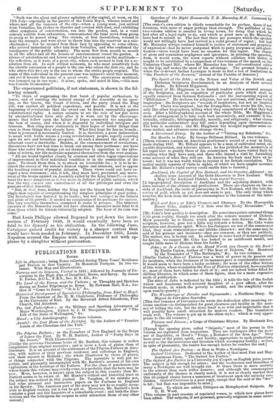LAMABTINE'S CONSTITUENT ASSEMBLY. *
Tax first volume of this history of the Constituent Assembly is not equal to Lamartine's previous works on the modern history of France. Part of its inferiority may be owing to the inferior na- ture of the subject for historical narration. The taking of the Bastile, with which the volume closes, is as yet the only real action in the whole narrative ; and that is distinguished by ferocity and blood on the side of the people, melodramatic weakness and indecision on the part of the Governor and the Court, so that an
• History of the Constituent Assembly (1789). By Alphonse de Lamartine, Author of " The History of the Restoration of Monarchy in France." Volume 1. Published by Vizetelly and Co.
event striking in itself rather produces disgust in the reader than excites interest. The previous story is little more than introduc- tory : the Assembly has done nothing ; the Court has less intrigued than tried to intrigue, and exposed its incapacity,. Occurrences of
the nature of processions or ceremonies are exhibited at too great length. Things not without interest in themselves occupy a space unappropriate to history,—as the affair of the diamond necklace,
of which a report is given that might stand in a book of " cele- brated trials.' Mirabeau is introduced by a biography exceedingly
well done, but on too large a scale, for it occupies one-sixth of the volume. Other characters are presented according to the custom of this writer, but not always with his usual success. The King and Queen have been exhausted already ; there was little more to be said about them. Necker is unduly lowered, less in the ab- solute estimate than in the apparent determination to depreciate. In fine, the book wants matter in proportion to its length ; the author having fixed his scale upon that of his previous works. His new opinions (for M. de Lamartine was originally a hot Royalist) are also a drawback, accompanied as they are by his countrymen's tendency to theorize. He opens his book by tracing the French Revolution to the revival of printing : he might better have gone back to the intermixture of Gaul and Frank, which pro- duced the blood or race of Frenchmen. His characteristic of the philosophy of the eighteenth century, and its tendency in forming the mind of the more moderate Revolutionists, is true. But the spirit of a refined Republicanism, that slighted, in the abstract, kings and nobility, was equally prevalent in this country,—as may be read in Chesterfield, and above all in Pope ; traced in old Whig doctrines ; and embodied in the "Calves-head Club." The different results in the two countries is to be traced in the early and solid germs of English freedom ; the existence of different classes with various rights and privileges in fact or in opinion ; and above all, the practical character of the English mind, which in the main applies itself to the remedy of actual evils, while the impulsive and theoretical Frenchman aims at establishing per- fection all at once. This feeling, in common with his countrymen in general if they are not "Divine right" men, induces M. de La- martine to praise more in the aims of Revolutionists and the Revo- lution itself than English readers will agree with,—as the passion for equality, the union of the three orders in one assembly ; for the union rendered gestation and deliberation impossible, as the passion for equality has rendered submission impracticable in France to anything which any person disapproves of unless he is forced to submit. It is probable, indeed, that the existence of separate cham- bers would only have ended in selfish or factious delays, such as have more or less characterized all the legislative assemblies in France from the Restoration to the Republic of 1848; finally rendering government impracticable, and bringing representative institu- tions into contempt. The question of two Assemblies could, how- ever, have been better tried in 1789 with the power of the Crown ostensibly intact, and all the traditionary authority of magistracy and nobility yet unshaken in the estimation of many, than when all these had been overthrown.
With all these blots, the book is a clever affair. The author overdoes his work ; but it is very well overdone. He in- dicates, though sometimes too allusively, the philosophical specula- tions and their influence on the French mind, together with the Provincial disturbances and Parliamentary contentions with the Crown, that prepared the public for the Revolution and its out- break, as well as trained its leading actors. His sketch of Mira- beau's life and nature, though indulgent to that powerful but un- principled demagogue, is the best account of him that we have seen. Once get over the minute treatment of certain subjects, and the narrative may be commended for its clear and artistical ar- rangement, the amplitude and vivacity of the descriptions. Some- times,—as in the scenes at Versailles, where the timorous King and the contemptible Court tried to frighten the audacious Assem- bly headed by Mirabeau,—the fulness is appropriate. In other cases, it is rather the ability of a journalist than the graphic power of an historian that is employed. It is useless to conjecture whether Necker or anybody else could have staved off the Revolution,—thwarted as the Minister would undoubtedly have been by the Queen, the courtiers, and the clergy, and not supported by the King. The second dismissal of the popular though overrated financier, by leading to the capture of the Bastile, the armed revolt of the citizens, and the unpunished outrages of the rabble, was the " beginning of the end." Troops already concentrated in the neighbourhood of Paris had been uselessly moving about during the night : Lamartine thus pictures the feelings of the Parisians, and introduces with the news a well- known Revolutionist.
"The commotion produced in the hearts of the people by this species of nocturnal review of the forces of the Court, evinced itself on the awaking of the citizens on the following day, Sunday, the 12th July. The doorways of the houses, the streets, the public places, the gardens, were filled with a silent and gloomy crowd, wherein each communicated, in a low voice to his neighbour sinister conjectures about the events of the night. At noon, Paris was still ignorant of the dismissal and departure of M. Necker ; his supposed presence, therefore, in the councils of the King, reassured the people against the perils threatened by the agitators ; for while this Minister prompted the King and restrained the Court, no one could believe in an attempt against the National Assembly, which be himself had summoned round the throne. The dismissal of M. Necker was accordingly in the opinion of Paris, the only indubitable prelude to a counter-revolution ; but nothing in the let- ters received the previous evening from Versailles had afforded a glimpse of the change of Ministry. We have seen with what fidelity M. Necker had kept the King's secret of the conspiracy against himself; consequently, at Paris all were floating in a vague anxiety, which weighed down the spirits without affording a pretext for an explosion. • "Such was the silent and gloomy agitation of the capital, at noon, on the 12th July—especially in the garden of the Pa]ais Royal, whence issued and where met all the rumours of the city—when a young man, just arrived from Versailles, his clothes in disorder and covered with dust, and exhibiting other symptoms of consternation, ran into the garden' and, in a voice scarcely audible from exhaustion, communicated the fatal news from group to group as he passed along. The crowds, at first incredulous, refused to hear the stranger, and were about to throw him into the reservoir as a mis- chiefmaker ; but he escaped from their fury by appealing to some others, who arrived immediately after him from Versailles, and who confirmed the intelligence of the public, calamity. The news flew from mouth to mouth in all the alleys and all the houses of entertainment round the garden. A silence of astonishment and horror weighed for a moment on the multitude— the reflection, as it were, of a peat city, where each seemed to look for a re- solution from all. In such critical moments, he who most sensitively feels the electric concussion of a people is the one who utters the first cry, and he who utters this first cry is the one to whom the entire people respond. The name of this individual in the present case was unknown until that moment, and yet it became the name of a great event. The anonymous multitude was summed up in one man ; it arose, spoke, and acted in him,—this man was Camille Desmoulins."
The experienced politician, if not statesman, is shown in the fol- lowing remark.
"To think of suppressing the first burst of popular enthusiasm by terror, and of resisting the natural energy of the Assembly at its open- ing, as the Queen, the Count d'Artois, and the party round the King did, was against all political experience, and puerile. It is not at the beginning of revolutions that the sword can be drawn successfully against constitutional rights. A nation submits to see the rule of law put down by unconstitutional force only after it is worn out by the discourage- ments that follow upon the failure of hopes commonly too sanguine in the best of causes, and when it is disgusted by individual intrigues and treasons. Men cling more obstinately to their hopes of better things than even to those things they already have. What they hope for has no bounds ; what is possessed is necessarily limited. It is, therefore, a gross indiscretion to assail with feeble means a young revolutionary people, eagerly counting upon its new and boundless prospects. At such a moment the defeat of a reluctant court is inevitable. Besides, at the commencement of revolutions, discussions have not had time to break out among their partisans ; nor have those who suffer from change yet set themselves in opposition to the advo- cates of reform, nor the moderate separated themselves from the over-zealous. "All are bound together closely by common and often vague expectations of improvement in their individual condition or in the constitution of the state. To attack them then is to attack an irresistible foe ; it is to be de- clared the enemy of the nation's dearest rights and interests, and to oppose the headlong current of popular delusion. These views could not have es- caped a true statesman ; and, if felt, they must have prevented any move- ment of the troops against an Assembly called by the King himself,—a move- ment the more dangerous as it was made in defiance of public opinion, which was the very essence and embodiment of all the privileges and even the passions of that Assembly. "But, at that time, neither the King nor the Queen had about them a single man capable of comprehending the simplest principles of good policy. The Revolution was fostered in its cradle ; but was outraged in the fulness and pride of its growth : it needed no conspiracies of its partisans for success. The very courtiers themselves conspired to make it prosper. The bitterest enemies of the Monarchy could not have dictated measures more fatal to it than those which its friends voluntarily adopted. The hour of its ruin was come."
Had Louis Philippe allowed Eugeaud to put down the insur- rection of February 1848, it would eventually have been as fatal to his dynasty as his abdication. In the following June, Cavaignac gained credit for victory in a sharper contest than would have been needed in February. In December 1851, Louis Napoleon secured the Empire with acquiescence if not with ap- plause by a slaughter without provocation.



































 Previous page
Previous page